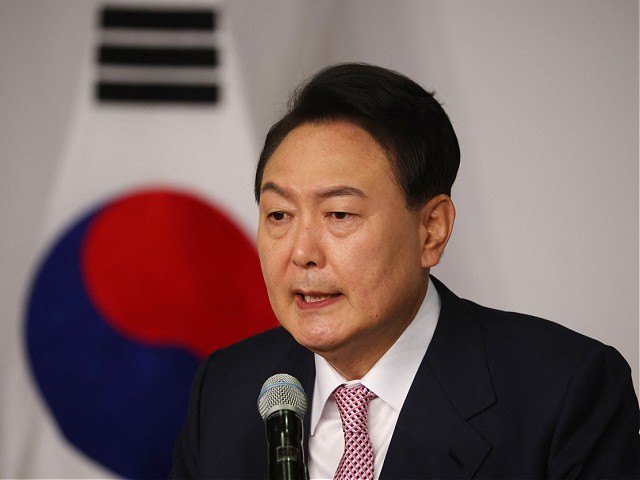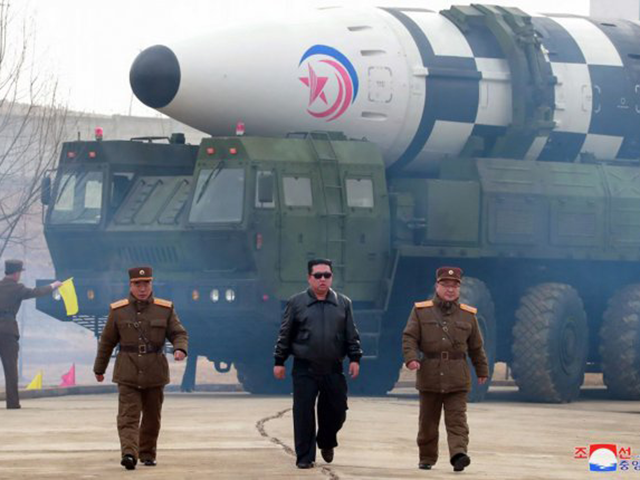South Korean President Yoon Suk-yeol led a meeting of NATO’s Asia-Pacific partners on the sidelines of the military alliance’s annual summit on Wednesday focused on combating the threat of communist North Korea, steering the conversation away from NATO members’ primary concern in Ukraine.
South Korea, Japan, Australia, and New Zealand are not formal members of the North Atlantic Treaty Organization (NATO), but enjoy special privileges as “Indo-Pacific partners.” This is the second year the four are invited to the NATO summit to enhance military cooperation agreements and discuss enhancing global security. South Korea, in particular, scored a special NATO deal that expanded cooperation in 11 different fields on Tuesday. Labeled an Individually Tailored Partnership Program (ITPP), the agreement allows for greater military communication and joint operations to combat cyberterrorism and other modern threats.

South Korea’s president-elect Yoon Suk-Yeol speaks during a news conference at the National Assembly in Seoul, South Korea on March 10, 2022. (Kim Hong-ji/Pool Photo via AP)
The two main issues NATO members are planning to address at this year’s meeting – held in Vilnius, Lithuania – are Sweden’s entry into the military alliance and a potential pathway for Ukraine to join. The Swedish membership is far less controversial, facing main opposition only from Islamist Turkey, which reportedly rescinded its opposition this week that had previously been on the grounds of Sweden not imposing blasphemy laws on citizens who burn the Quran in protest. Ukraine, currently approaching a decade of being in various states of war with Russia, has sought NATO membership for decades to no avail. Reports indicated this week that NATO will offer Ukraine a limited partnership, similar to its agreement with non-member Israel, prompting Ukrainian President Volodymyr Zelensky to publish a tirade on social media accusing NATO of disrespecting his country and calling the lack of a rigid timeline for entry into the alliance “unprecedented and absurd.”
Both South Korea and Japan made clear prior to the beginning of the summit that their main security concerns were about communist North Korea – whose dictator Kim Jong-un called for an “exponential increase of the country’s nuclear arsenal” in December – and its top ally and benefactor, China, which has increased its belligerent activities against neighbors in the past decade. The presence of Yoon and Japanese Prime Minister Kishida Fumio, both conservatives, at the NATO summit prompted outrage and disgust in Beijing.
“Such a short-sighted move will surely trigger China’s strong opposition and result in regional countries’ heightened vigilance!” the state-run Chinese propaganda newspaper Global Times proclaimed last week.
Undeterred, Yoon made the focus of the sideline meeting between himself, Kishida, Australian Prime Minister Anthony Albanese, and New Zealand Prime Minister Chris Hipkins North Korea, not Ukraine. Yoon made the case that, with intercontinental ballistic missiles (ICBMs) and nuclear weapons, North Korea is as much a threat to Europe as it is to eastern Asia. North Korea launched an ICBM in protest towards the waters off of Hokkaido, northern Japan, on Wednesday, an apparent protest of the discussion at the NATO summit.
“North Korea’s nuclear missiles are a real threat that can hit not only Vilnius but also Paris, Berlin and London,” Yoon said at the meeting on Wednesday. “We must unite more strongly and condemn and respond with one voice.”
“In today’s ultraconnected era, we cannot separate the security of Europe from that of Asia,” he insisted, according to the South Korean news agency Yonhap. “We will also expand military information sharing with NATO.”
Yoon mentioned Ukraine in passing – “South Korea and I promise to stand with the Ukrainian people until the day their freedom is fully regained,” he said, according to the Korea JoongAng Daily – but the joint statement from the four NATO associated nations focused primarily on North Korea.
“The Republic of Korea [South Korea], Japan, Australia, and New Zealand strongly condemn today’s long-range ballistic missile launch by North Korea,” the statement read in part. “This is yet another example of how North Korea continues to violate multiple UN Security Council resolutions and pose a grave challenge to peace and stability of the Korean Peninsula, Indo-Pacific region as well as the international community.”
“The four countries resolutely oppose North Korea’s unlawful provocation and urge it to fully comply with all of its obligations under the relevant UN Security Council resolutions,” the statement continued. “We will work together with the UN and members of the international community to ensure that UN Security Council resolutions that impose sanctions against North Korea are effectively implemented.”
Yoon, who took office last year, has prioritized strengthening his country’s stance against North Korea, with which it is still technically at war, after his predecessor Moon Jae-in focused on dialogue and cooperation with Pyongyang. Moon, a leftist, visited North Korea repeatedly and established a “liaison office” for mutual dialogue in 2018. North Korea bombed the office in 2020.
Pyongyang’s growing aggression against the South during Moon’s tenure has increased popular appetite for an independent, South Korean nuclear weapons program. Multiple polls taken the year have found that around 70 percent of South Koreans would support the country developing its own nuclear weapons, rather than relying on America.
“The Republic of Korea could deploy tactical nuclear weapons or possess its own nukes,” Yoon mused in January, alarming Washington. “It won’t take long for us to have one, given our scientific and technological capabilities.”
The mayor of Seoul, Oh Se-hoon, cited Russia’s invasion of Ukraine as adding to the general sentiment that not having nuclear weapons leaves a country open to attack.
“North Korea has nearly succeeded in miniaturising and lightening tactical nuclear weapons and secured at least dozens of warheads,” Oh told Reuters in March. “We’ve come to a point where it is difficult to convince people with the logic that we should refrain from developing nuclear weapons and stick to the cause of denuclearisation.”
“There may be some initial resistance from the international community, but I believe that it will gain more support eventually,” he added.
Yoon visited the United States in April; amid heightened conversation of a potential nuclear South Korea, leftist American President Joe Biden agreed to station an American nuclear-powered submarine in the country, adding nuclear deterrence and outraging Pyongyang. The USS Michigan arrived in the southern port city of Busan in June.
On Monday, the North Korean Defense Ministry threatened to shoot down American Air Force planes in response to alleged American and South Korean “provocations.”
“There is no guarantee that such shocking accident as downing of the U.S. Air Force strategic reconnaissance plane will not happen in the East Sea of Korea,” a statement from the Ministry asserted.

COMMENTS
Please let us know if you're having issues with commenting.